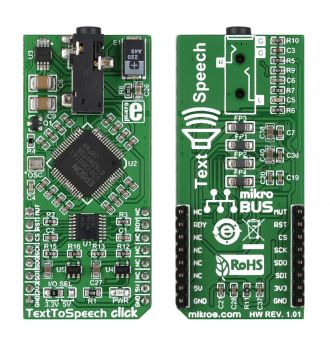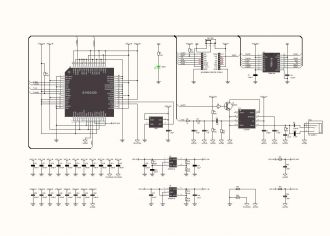
We strongly encourage users to use Package manager for sharing their code on Libstock website, because it boosts your efficiency and leaves the end user with no room for error. [more info]

Rating:
Author: MIKROE
Last Updated: 2016-06-02
Package Version: 1.0.1.0
Category: Speakers
Downloaded: 2344 times
Not followed.
License: MIT license
Text To Speech click is a mikroBUSâ„¢ add-on board that carries an Epson S1V30120 speech synthesis IC. Text To Speech communicates with the target board microcontroller through the mikroBUS SPI interface with additional functionality provided by DRDY, NRST and MUTE pins. It can use either a 3.3V or 5V power supply.
Do you want to subscribe in order to receive notifications regarding "TextToSpeech click" changes.
Do you want to unsubscribe in order to stop receiving notifications regarding "TextToSpeech click" changes.
Do you want to report abuse regarding "TextToSpeech click".
| DOWNLOAD LINK | RELATED COMPILER | CONTAINS |
|---|---|---|
| 1464865695_texttospeech_cli_mikroc_arm.zip [1.09MB] | mikroC PRO for ARM |
|
| 1464865740_texttospeech_cli_mikroc_avr.zip [1.09MB] | mikroC PRO for AVR |
|
| 1464865762_texttospeech_cli_mikroc_ft90x.zip [1.08MB] | mikroC PRO for FT90x |
|
| 1464865784_texttospeech_cli_mikroc_pic.zip [1.08MB] | mikroC PRO for PIC |
|
| 1464865803_texttospeech_cli_mikroc_pic32.zip [1.08MB] | mikroC PRO for PIC32 |
|

Text To Speech click is a mikroBUS™ add-on board that carries an Epson S1V30120 speech synthesis IC. The IC is powered by the Fonix DECtalk® v5 speech synthesis engine that can make your robot or portable device talk in US English, Castilian Spanish or Latin American Spanish, in one of nine pre-defined voices. The DECtalk engine includes a parser that gives users fine control over the quality, pitch and intonation of the synthesized speech. The audio is reproduced at 11.025kHz sampling rate. Text To Speech click board communicates with the target board microcontroller through the mikroBUS™ SPI interface (MISO, MOSI, SCK, CS) with additional functionality provided by DRDY, NRST and MUTE pins (in place of default mikroBUS™ INT, RST and AN pins) It can use either a 3.3V or 5V power supply.
Applications
Talking robots, text to speech and speech processing applications for embedded systems and portable devices.
Key features
- Fonix DECtalk® v5 fully parametric speech synthesis
- Languages: US English, Castilian Spanish, Latin American Spanish
- 11.025 kHz sampling rate
- SPI interface
Key benefits
- Nine pre-defined voices
- Languages: US English, Castilian Spanish, Latin American Spanish
- Ready-to-use examples save development time
